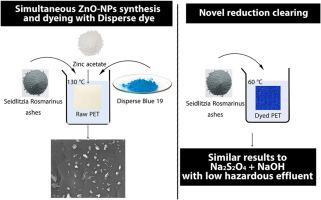Seidlitzia rosmarinus as a multipurpose environmentally friendly alkali in simultaneous dyeing and nanofinishing of polyester fabric: ZnO-NPs synthesis, carrier-free dyeing, and reduction clearing
IF 5.3
Q2 ENGINEERING, ENVIRONMENTAL
引用次数: 0
Abstract
A multipurpose product could be produced by synthesizing metal oxides and dyeing the fabric. However, to achieve better, cleaner results while consuming less energy, it is ideal to shorten the time and reduce costs by simultaneously creating nanoparticles and dyeing. This work facilitates carrier-free dyeing of polyester fabric and the synthesis of ZnO-NPs using Kelyab as a green alkali. The remarkable results demonstrated reduced bending length, i.e., a softer handle, higher air permeability, and tensile strength, longer resistance in alkaline conditions, and comparable color strength and fastness. Moreover, the after-treatment, the last treatment step on the finished or dyed fabric, pertains to the reduction clearing. It is essential for dyed PET fabric, given its significance in colorimetric characteristics and other fastness attributes, particularly washing. Thus, it is necessary to develop innovative techniques to achieve these objectives without using harmful chemicals. Kelyab, as an environmentally safe reducing agent, produced comparable results to those of the conventional method, especially in color strength. In addition, air plasma was applied as a surface activation and green pre-treatment, resulting in the highest color and tensile strength. The prepared samples were examined using FT-IR, XRD, and FESEM, among other tests. Using fewer chemicals (50% lower) in the reduction clearing, saving time and energy for preparing reduction solution, and lowering the requirement for waste-water treatment in the simultaneous nanosynthesis and dyeing are the novelties of the introduced processing that can replace conventional method in dyeing, post-dyeing, and nanofinishing treatments.

Seidlitzia rosmarinus 作为一种多用途环保碱,用于涤纶织物的同时染色和纳米整理:ZnO-NPs 的合成、无载体染色和还原清算
通过合成金属氧化物和对织物进行染色,可以生产出多用途产品。然而,为了达到更好、更清洁的效果,同时消耗更少的能源,理想的做法是通过同时制造纳米粒子和染色来缩短时间和降低成本。这项研究利用 Kelyab 作为绿色碱,实现了涤纶织物的无载体染色和 ZnO-NPs 的合成。研究结果表明,涤纶织物的弯曲长度缩短,手感更柔软,透气性和拉伸强度更高,在碱性条件下的耐久性更长,着色力和牢度相当。此外,后处理是对成品或染色织物的最后处理步骤,与还原清纱有关。鉴于其在色度特性和其他牢度属性(尤其是水洗)方面的重要性,后处理对染色 PET 织物至关重要。因此,有必要开发创新技术,在不使用有害化学品的情况下实现这些目标。Kelyab 作为一种对环境安全的还原剂,产生了与传统方法相当的效果,尤其是在颜色强度方面。此外,还采用了空气等离子体作为表面活化和绿色预处理,从而获得了最高的色度和拉伸强度。对制备的样品进行了傅立叶变换红外光谱、X 射线衍射和 FESEM 等测试。减少还原清液中的化学品用量(减少 50%)、节省配制还原液的时间和能源、降低同时进行纳米合成和染色时对废水处理的要求,这些都是所介绍的处理方法的新颖之处,可在染色、染色后处理和纳米整理处理中取代传统方法。
本文章由计算机程序翻译,如有差异,请以英文原文为准。
求助全文
约1分钟内获得全文
求助全文
来源期刊

Cleaner Engineering and Technology
Engineering-Engineering (miscellaneous)
CiteScore
9.80
自引率
0.00%
发文量
218
审稿时长
21 weeks
 求助内容:
求助内容: 应助结果提醒方式:
应助结果提醒方式:


